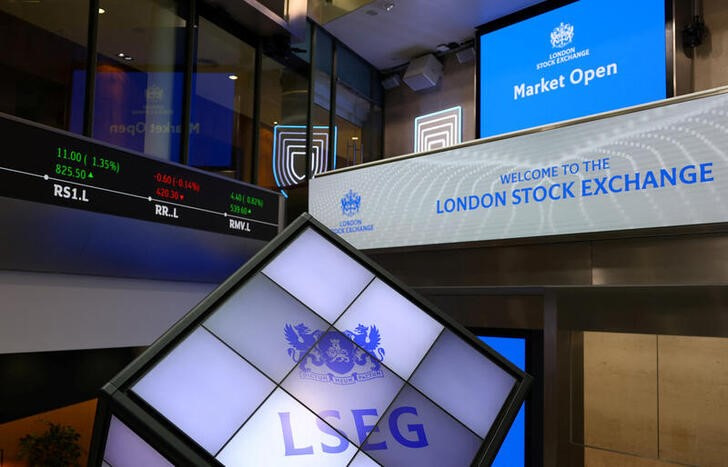LONDON (Reuters) – Thanks in part to former UK Prime Minister Liz Truss’ singular contribution to financial stability two years ago, Britain is proving something of an exception among major economies heading for elections this year – there’s little or no fiscal or financial controversy.
And perhaps the Truss episode is even reining in other G7 countries too by neatly having illustrated exactly what not to do if you want to gain or stay in power and don’t want to scare the horses. Even the French far right are softening their tone as weekend polls near – just in case.
Following a late 2022 budget farce during the brief tenure of the erstwhile UK Prime Minister – when UK government bonds and sterling almost imploded following a hasty, unfunded tax and spending giveaway – neither major British party now dares to suggest it’s veering from the fiscal straight and narrow.
And it pitches chastened Britain as something of an outlier among peers heading to the multiple elections this year – despite a likely change of government for the first time in 14 years and what opinion polls suggest will be a landslide 200-seat majority for the opposition Labour Party on July 4.
Remarkable in that looming change of government is the fact that Labour offers few fiscal teasers and has relied largely on the mounting unpopularity of the incumbent conservatives – with the latter’s lasting signature legacy of Brexit now even rejected by a majority of the electorate who wanted it.
For global investors, the change of government appears to be welcomed with open arms.
And in a world facing the uncertainty of possible second U.S. presidential term for Donald Trump come November or the far right and far left vying for a parliamentary majority in France over the next fortnight, Britain suddenly seems like an unlikely haven of stability.
Despite the prospect of Labour returning with the biggest majority since World War Two, Dutch bank ING described the poll as a ‘non-event’ for markets – so you get the picture.
This outcome has been long expected, appears to ruffles few feathers and may even be welcomed widely by overseas funds as a shift away from the serial economic fractures, financial crises, leadership switches and internal government rebellions.
Just 10 days from the election, the Bank of England’s trade-weighted sterling index is close to its highest since the Brexit referendum in 2016 – almost 25% up from the nadir of the Truss budget.
Historical 30-day volatility of that index is less than a fifth of the peaks it hit two years ago and around the pandemic.
It’s a similar picture for the blue-chip FTSE100, which is just shy of record highs set last month and clocking one-month volatility less than half its 10-year averages.
Ten-year gilts – and the heart of any fiscal concern – are a different matter.
But despite the hit from post-pandemic inflation and Bank of England interest rate rises, yields and volatility have subsided there this year too and the risk premium over Germany has fallen by about 100 basis points from the Truss blowout peaks.
‘MERCIFULLY SHORT’
Buoyant world markets may have something to do with that picture. But relative UK positioning by global funds has improved markedly even as Labour poll leads mounted.
The June global fund manager survey from Bank of America, for example, shows investors a net 12% underweight UK equities – but that’s 0.3 standard deviation above the long-term 20-year average.
Similarly, only a net 5% of fund managers think the pound is still undervalued – just 0.3 standard deviation below the long-term average valuation.
And the view from many overseas investors about a change of government is sanguine at worst.
Franklin Templeton Institute Investment Strategist Kim Catechis described the feeling as one of “cautious optimism” – after a torrid decade of Brexit, the pandemic, rising interest rates, five prime ministers and seven finance ministers.
Echoing ING’s take, Catechis said the ‘mercifully short’ six week election campaign was “unusual in its blandness”.
This, he reckons, sidesteps the real issues and perhaps puts off harder decisions needed to disentangle the UK economy from a net of weak growth, weak productivity and high inequality.
“Both main parties are ignoring the obvious point – that all remedies will require financing via debt or increased taxes, or both.”
But the Franklin Templeton strategist said this was not a unique among major economies and said there was a degree of positivity among investors about the likely change of power.
“Capital markets appear to be positive about the prospect of a change of government – in the expectation that policy direction will be pro-growth but with a cautious approach to fiscal policy,” he said.
“The fixed income market recognizes that the Labour Party must be keen to serve two terms because the party’s project cannot be delivered in four years – so fiscal orthodoxy is virtually guaranteed.”
And this along with better relations with the European Union will buoy sterling. “A change of government, the perception of less friction in trade with the EU and … the expectation of stability and orthodox policy direction could provide further support to sterling this year,” he concluded.

Long-unloved UK markets may be in for a rare period of political calm even though that may leave them out of step again with most restive peers – though this time for positive reasons.
The opinions expressed here are those of the author, a columnist for Reuters
(by Mike Dolan X: @reutersMikeD; Editing by Josie Kao)
To read the full article, Click Here

